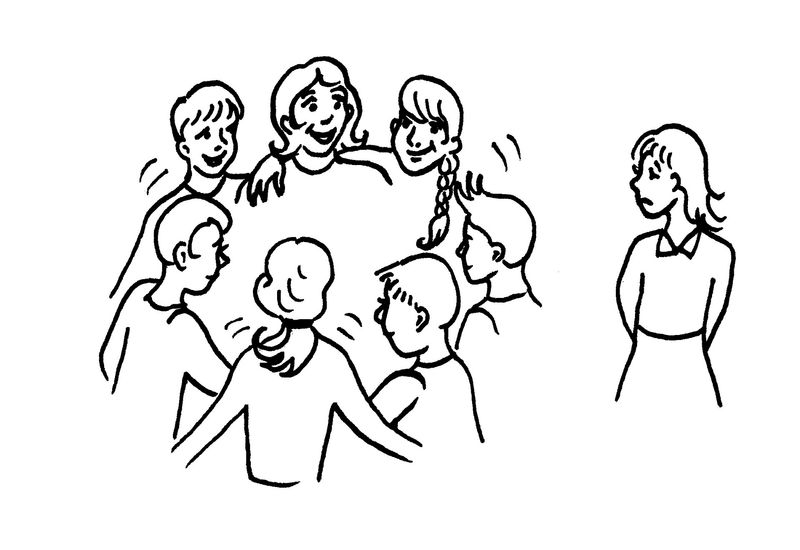16 Tips On How To Stand Up For Yourself In Awkward Social Situations
You know those moments when your chest tightens, your mind races, and you feel stuck between saying what you need and keeping the peace? Yeah, I’ve been there too—more times than I want to admit.
If you’ve ever walked away from a party, a work meeting, or even a family dinner replaying what you should have said, you’re not alone.
This isn’t about being loud or turning every awkward moment into a showdown. It’s about choosing yourself, even when it feels easier to shrink. Here are 16 real, honest ways to stand up for yourself—because your voice deserves a seat at the table, awkwardness and all.
1. Acknowledge What’s Really Bothering You

Sometimes the hardest part is admitting to yourself what’s really going on. Naming the thing is an act of courage. Ask yourself: What hurt? Was it being ignored, feeling small, or something else entirely?
This isn’t about fixing everything at once. It’s just about being honest—at least with yourself. When you call out the real reason you’re upset, you lay the groundwork to actually do something about it. That’s where change starts, and it’s not as scary as it seems.
Don’t rush this. Give yourself a moment, even if it’s just a mental whisper in the bathroom. It’s not dramatic—it’s necessary. Most people skip this step and wonder why nothing ever changes. Don’t be most people. Start here.
2. Visualize a Different Ending

Ever replayed a conversation in your head, wishing it had gone differently? You’re not alone. Awkward moments have a way of sneaking up on you, but sometimes you see them coming. That’s your chance. What if you ran that scenario before it happened, and saw yourself actually saying what you needed to say?
I started doing this before hard conversations. It didn’t make me bold overnight, but it did take the sting out of the unknown. When the moment finally arrived, I didn’t freeze like usual. I had my words ready, and I stuck to what mattered. It wasn’t perfect, but it took the edge off.
Visualization isn’t just athlete stuff. It trains your brain to expect a better outcome. Next time you know an awkward social moment is coming, close your eyes and imagine yourself handling it with just a little more confidence. You might surprise yourself. Little rehearsal, big shift.
3. Start with Small Risks

I used to think standing up for myself meant confronting my boss or calling out a rude friend. But sometimes, it’s just saying, “Actually, I want sushi tonight.”
Taking tiny risks where the fallout is low—like choosing where to eat or voicing an opinion about movie plans—builds up courage muscle. It sounds silly, but that stuff adds up. Each time you risk a little awkwardness, you prove to yourself you can handle a bit more.
Soon, setting boundaries feels less like leaping off a cliff and more like stepping over a puddle. You don’t have to start with the hardest conversation in your life. Pick a small one, practice, and celebrate when you make it through. That’s real progress—not just for extroverts.
4. Give Yourself Permission to Set Boundaries

When someone gets too close, physically or emotionally, it’s easy to freeze or laugh it off. I spent years letting people overstep because I thought it was my job to make everyone else comfortable.
One day, I realized nobody was going to set boundaries for me. I had to be the one to say, “I need space,” or “That’s not okay.” It felt awkward, but the relief after was worth every second of discomfort.
Setting boundaries isn’t rude. It’s not selfish. It’s drawing a line where you end and others begin. The people who respect you will adjust. The rest? Well, they’re just not your people. Remember, your needs matter as much as anyone else’s in the room.
5. Master the “I” Statement

Have you ever tried to express your feelings and watched the other person instantly get defensive? Same. Then I learned the ancient magic of the “I” statement—suddenly, people actually listened.
When you say, “I feel hurt when I’m interrupted,” instead of “You always interrupt me,” you invite conversation instead of starting a fight. It lowers the heat, and trust me, it changes everything. People hear you instead of just hearing blame.
Try it next time your stomach knots up during a chat. Phrase it like, “I need a second to finish my thought.” It won’t fix every relationship, but it will make awkward moments less explosive. You’re allowed to speak up without burning the place down.
6. Listen Like You Mean It

Sometimes standing up for yourself is actually about slowing down and listening. Sounds backwards, but hear me out. When I stopped planning my comebacks and just listened, I noticed the energy in the room shifted.
People relax when they feel heard, which makes it easier to say your point of view without the other person bracing for a fight. Active listening isn’t just nodding; it’s asking, “Did I get that right?” or, “Can you tell me more?”
It’s weirdly powerful. Try it next time you’re itching to defend yourself. The more you hear them, the easier it is for them to hear you. It’s a sneaky way to build trust in even the messiest moments.
7. Let Your Body Speak for You

Your body tells the truth even when your mouth can’t. I noticed that when I stood up straighter and looked people in the eye, I started feeling braver—even before I said a word.
You don’t need to be the life of the party. Shoulder back, chin up, feet planted. Even if you’re faking it, your brain starts to catch on. Sometimes my legs shook, but nobody noticed.
Confident body language works both ways—it calms you and signals to everyone else that you’re not backing down. It’s not about looking tough. It’s about showing you’re here, you’re real, and you’re not fading into the background. Try it. You’ll notice the shift.
8. Let Go of Perfect Responses

I wasted years trying to say the “right” thing, terrified of looking foolish or fumbling my words. Looking back, I wish someone had told me: nobody cares as much as you think.
Awkwardness is universal. The truth is, even if you mess up, most people won’t remember. The important part is that you tried. When I finally let myself be imperfect, I didn’t dread social situations as much.
Take the pressure off. Stumble, laugh, move on. Next time you replay a conversation, notice how little those details matter. Show up real, not flawless. That’s what people actually remember, anyway.
9. Ask for Backup When You Need It

Once, after an impossibly awkward work party, I called my sister in the parking lot and just vented. Occasionally, the bravest thing is saying, “I need help.”
Support isn’t just for the big stuff. Ask a friend to join you at a tough event, or text someone mid-dinner for a pep talk. Just knowing someone’s in your corner changes the whole vibe.
You’re not weak for needing backup. You’re human. At times the best way to stand up for yourself is letting someone else remind you why you’re worth it. Don’t be afraid to tag in your people.
10. Use Humor (When You Can)

Humor, when it’s genuine, can slice through the weirdest tension. It’s not about being the class clown—just finding a moment of lightness in the heavy parts.
If someone makes a bizarre comment, sometimes joking, “Wow, brave opinion!” can break the ice. It doesn’t work every time, but when it does, everyone takes a breath, including you.
This isn’t avoidance. It’s a way to signal, “Hey, I’m not rattled by this.” Use it when it feels natural. If you’re not the jokey type, no worries—just a smile or a self-deprecating comment can do wonders for your nerves and the room.
11. Don’t Explain Yourself Into Oblivion

Guilty as charged: I used to explain every decision, hoping nobody would think I was rude. Turns out, overexplaining doesn’t make people like you more—it just drains your energy.
You’re allowed to say, “I can’t make it,” or “I’d rather not talk about that,” and leave it there. No lengthy defense required. The less you justify, the more confident you sound (even if you don’t feel it yet).
Practice short, clear answers. Let the silence hang for a beat. It might feel uncomfortable at first, but it’s strangely empowering. You don’t owe anyone a ten-slide PowerPoint on your choices.
12. Pause Before You React

I used to blurt out the first thing that came to mind, just to survive awkwardness. It never worked. Pausing—literally taking a breath—gave me a second to regroup and respond on my terms.
Now, when I feel my cheeks get hot, I slow down. Sometimes I even say, “Let me think about that.” Shocking, I know. But it works. The conversation doesn’t run away without you.
It’s not weakness. It’s control. It’s you stepping back from the cliff’s edge and choosing what happens next. Try it at your next uncomfortable gathering. Take the space, even if it feels weird. It’s yours.
13. Call Out Patterns, Not People

Telling someone, “You’re always late,” never goes well. But saying, “I’ve noticed meetings often start late, and it throws off my schedule?” That’s different. You’re talking about a pattern, not attacking a person.
When you call out patterns, people are less likely to get defensive. It’s not a blame game—it’s a team effort to fix a shared problem.
Patterns are easier to discuss than personalities. Next time something irks you, zoom out. Notice the trend, name it, and see how the conversation shifts. It’s a subtle power move, trust me.
14. Remember Your Worth Isn’t Up for Debate

There were times I let other people’s criticism decide how I felt about myself. Bad idea. Your worth isn’t something to be haggled over at the table.
If someone questions your choices, it doesn’t mean you’re wrong. If they push your boundaries, it doesn’t mean you’re too much. Your value isn’t up for discussion, ever.
Remind yourself, even if it’s in the middle of a crowded room: You’re allowed to take up space. You don’t need permission. Your worth is a fact, not an opinion. That changes how you walk into every awkward moment.
15. Embrace the Awkwardness

I once spilled soda on my lap at a work event and tried to pretend nothing happened. Guess what? Everyone saw. So, I owned it, laughed, and moved on. The sky didn’t fall.
Awkwardness is like quicksand—the more you struggle, the deeper you sink. But if you let yourself float, it passes. When you own the weirdness, it loses its bite.
Don’t run from those moments. Let them be part of your story. You’ll find that most people are relieved when someone else drops the mask first. Be that person. It’s weirdly freeing.
16. Let Yourself Leave Uncomfortable Spaces

Not every situation deserves your energy. I used to stick around in groups that made me feel small, telling myself to just tough it out. Then, I realized I could actually get up and leave.
Walking away isn’t quitting. It’s you showing up for yourself. Trust your gut—if something feels wrong, you don’t have to stay and explain your discomfort to anyone.
Give yourself permission to exit. The world won’t end if you leave one bad dinner or party. From time to time, the strongest thing you can do is simply walk away, head held high.







